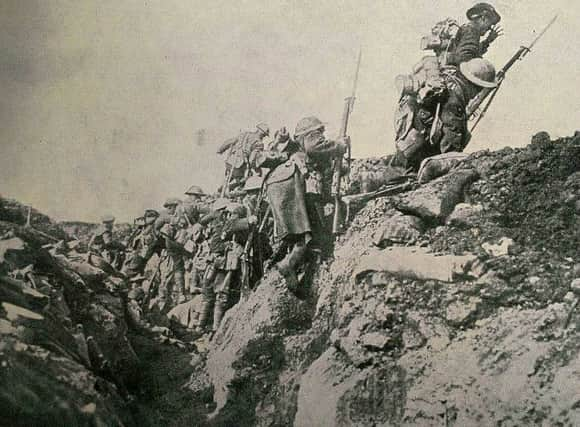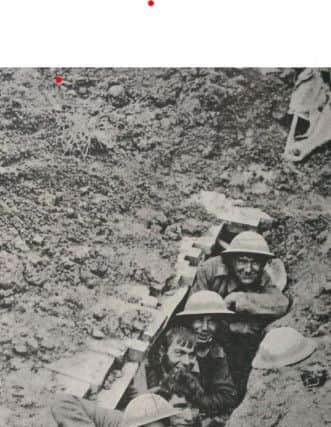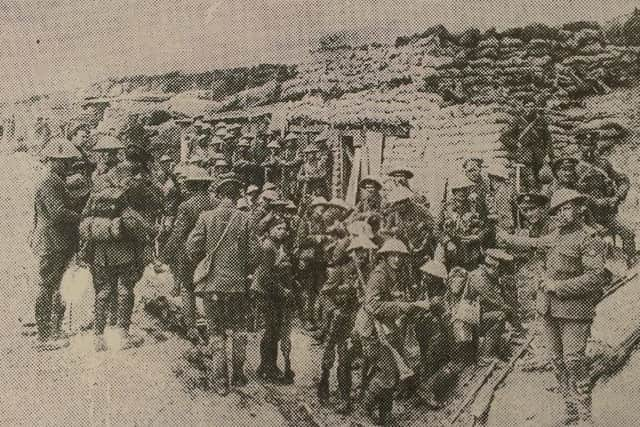'˜An absolute inferno': how Northampton men won a victory at the Somme


Three times other regiments tried but failed to take it.
The Northamptons, however, who were going ‘over the top’ for the second time in two weeks achieved what the others could not.
On the previous night, a couple of divisions had been commanded to capture the enemy’s second line.
Advertisement
Hide AdAdvertisement
Hide Ad

Just before dawn, it was discovered that Trones Wood, which was supposed to be in British Hands, had been recaptured by the enemy apart from a small portion where the 7th West Kents were holding out in peril of being surrounded.
It was a critical situation demanding immediate action, as the left flank was being menaced so orders were sent to the Northamptons to rescue the situation.
Although there was no time to explain the plan of attack, initiative of the officers and bravery of the men won a heartening victory.
Soon after daybreak, Major G M Clark led the Northamptons attack.
Advertisement
Hide AdAdvertisement
Hide Ad

They had to cross a thousand yards of open ground through a heavy barrage of high explosive.
Some casualties were caused by the West Kents mistaking the Northamptons for Germans. They were actually facing south and it was not until the major produced his compass that they were convinced they were not heading north.
The mistake was understandable as the wood was described as a wilderness of fallen trees, thick undergrowth, a maze of trenches and barbed wire, infested on all sides by snipers and machine guns.
“The inside of the wood was an absolute inferno,” wrote Major S H Charrington, who took command after Major Clark had been killed. “Enormous shells were bursting all the time and trees flying bodily in all directions.


“Officers and men fought like heroes.”
Advertisement
Hide AdAdvertisement
Hide AdHand-to-hand fighting took place and men fought with clubbed rifle and bayonets. A Corporal Radley, after losing his rifle, fought four Germans with his bare fists.
The Northampton Independent wrote: “The booming of artillery, the scream of shells soaring overhead, the crackling of rifles and machines guns, the explosion of bombs, the crash of falling trees mingling with angry shouts and the cries of the wounded, making a fiendish uproar - fit accompaniment indeed to the hellish business of war.”
The Germans were told they must hold the wood at all costs and fought stubbornly and bravely, but the Northamptons were even more determined.


Battle swayed one way then another until at 10pm the wood was in the Northamptons’ hands.
Advertisement
Hide AdAdvertisement
Hide AdFleeing Germans were killed by Lewis gunners, leaving a great many dead and wounded.
A prisoner who had fought against the 6th Battalion two weeks earlier, referring to the regimental badge, was reported by the Independent as saying: “We don’t like you black patch men. You never turn back.”
The Northamptons had to hold the position they had won for the next two days, and were not relieved until 5am on July 16.
They had been fighting continuously for 98 hours and some had only the odd hour of sleep in 109 hours.
Advertisement
Hide AdAdvertisement
Hide AdNorthamptons casualties were 38 killed, 204 wounded and 35 ‘missing’.
When he finally inspected the remnants of his shattered battalion at Brigade HQ, Colonel G E Ripley, was greatly affected, but said it was a consolation to feel that his heroic comrades had not died in vain.